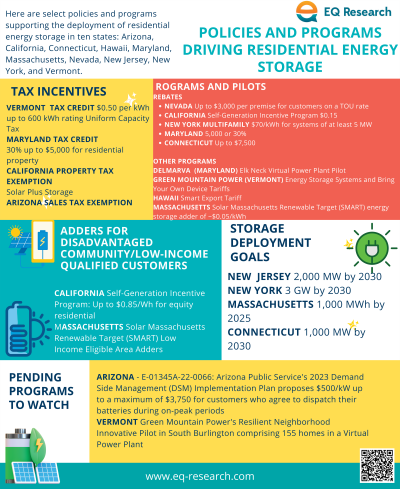Back

Regulatory Innovation and Policy Drivers
State Policy and Utility Programs Driving Residential Energy Storage
Tuesday, September 12, 2023
4:30 PM - 5:30 PM PDT
Location: Poster Area, Booth #11024, Level 1, Venetian Expo Hall


Miriam Makhyoun, CEO
CEO
EQ Research
Cary, North Carolina, United States
Poster Presenter(s)
Background, Description, Delivery and Learning Objective Resiliency is ever more important to residential customers who depend on reliable power from their utility. Behind-the-meter energy storage continues to become more affordable but is still too costly for most people. Some states and utilities have addressed this issue by setting energy storage targets, providing tax incentives, designing rates for homes to participate in utility programs through energy storage, and providing rebates to customers. Many have tailored their aims to provide firm backup power supply to people from disadvantaged communities or who are qualified as a low-income customer.
This study is a comparison of policies supporting the deployment of residential energy storage in ten states: Arizona, California, Connecticut, Hawaii, Maryland, Massachusetts, Nevada, New Jersey, New York, and Vermont.
Questions Addressed include:
What tax incentives exist?
What residential battery storage programs and/or pilots exist?
What adders exist for disadvantaged community/low-income qualified customers?
What incentives are available for the installation of battery storage systems?
Does the state have storage deployment goals?
What open dockets regarding residential battery storage incentives and programs exist?
This study is a comparison of policies supporting the deployment of residential energy storage in ten states: Arizona, California, Connecticut, Hawaii, Maryland, Massachusetts, Nevada, New Jersey, New York, and Vermont.
Questions Addressed include:
What tax incentives exist?
What residential battery storage programs and/or pilots exist?
What adders exist for disadvantaged community/low-income qualified customers?
What incentives are available for the installation of battery storage systems?
Does the state have storage deployment goals?
What open dockets regarding residential battery storage incentives and programs exist?
